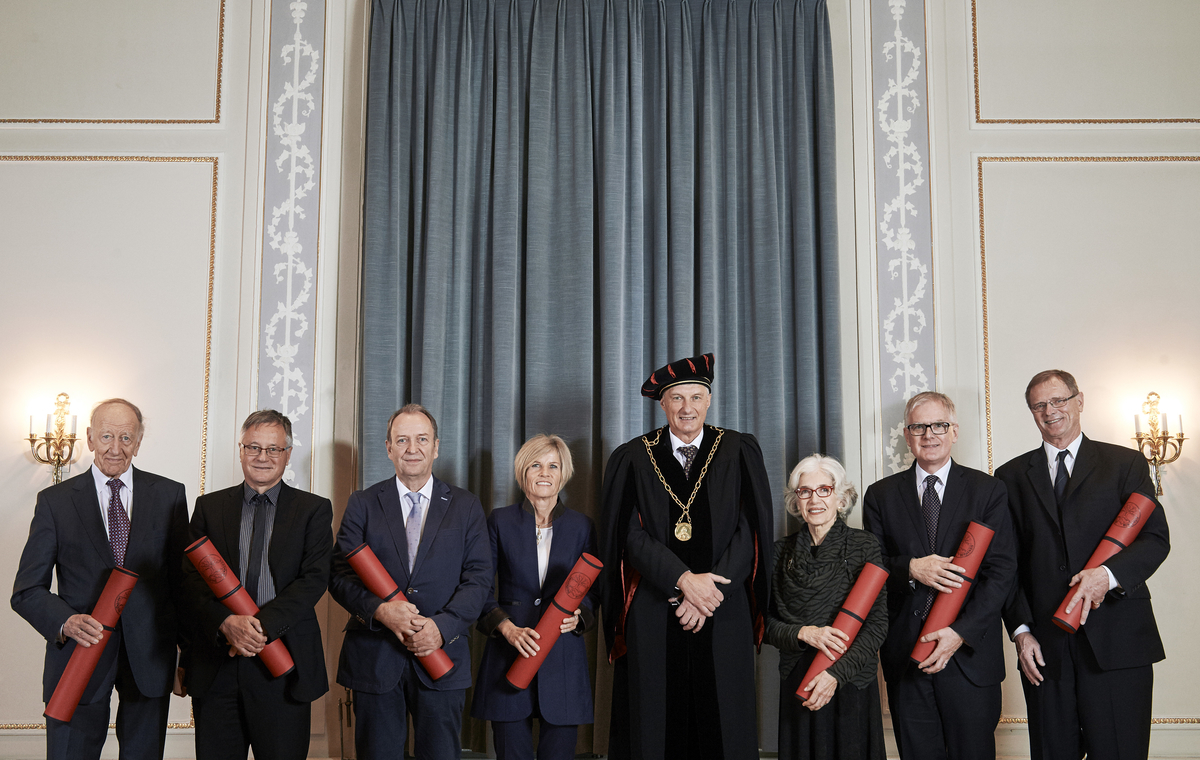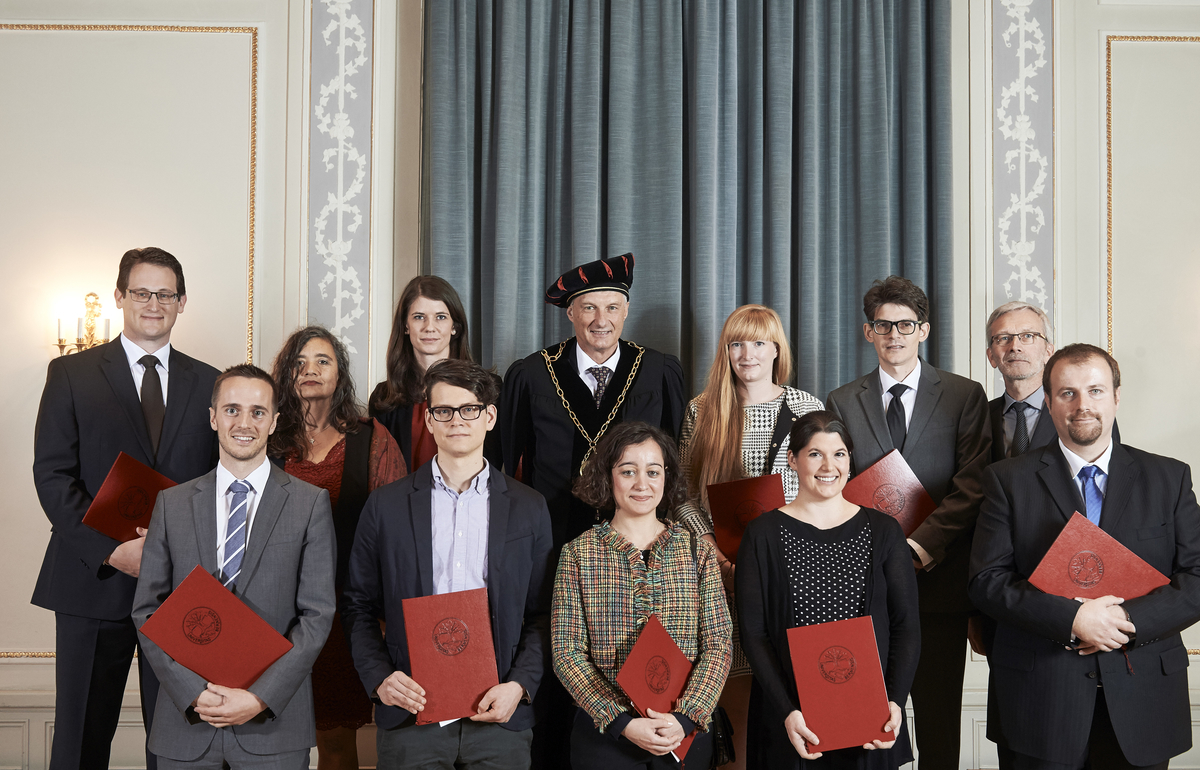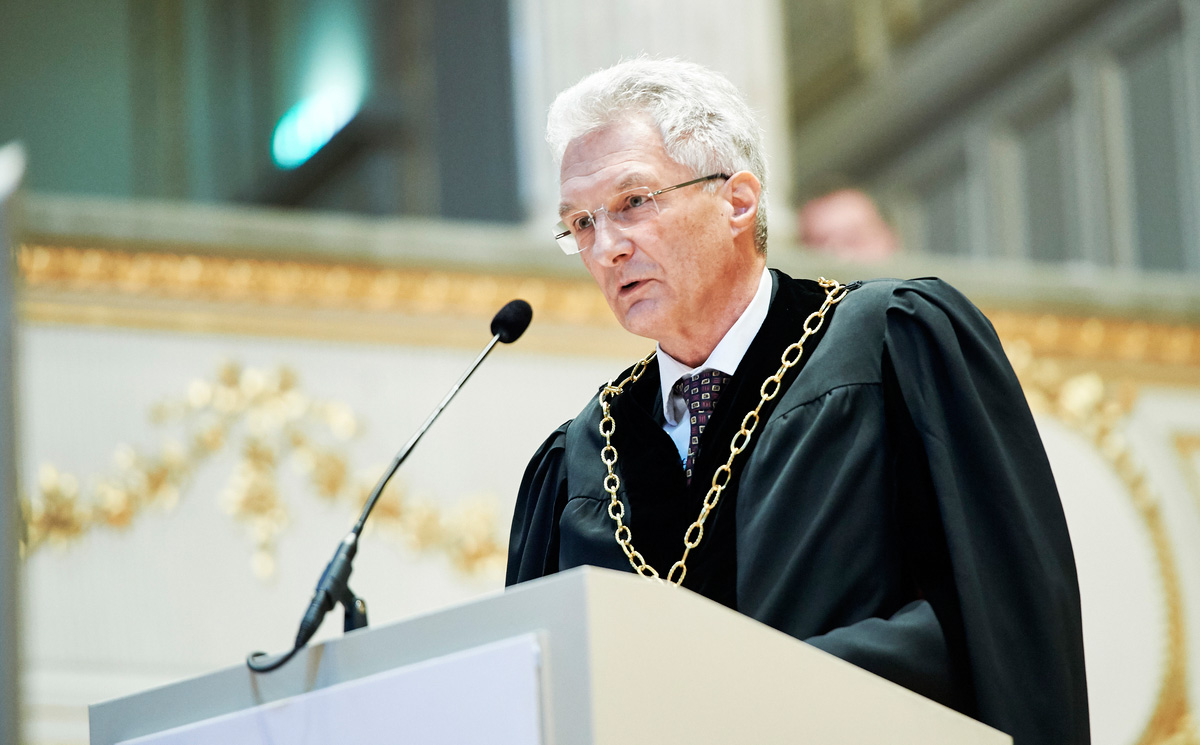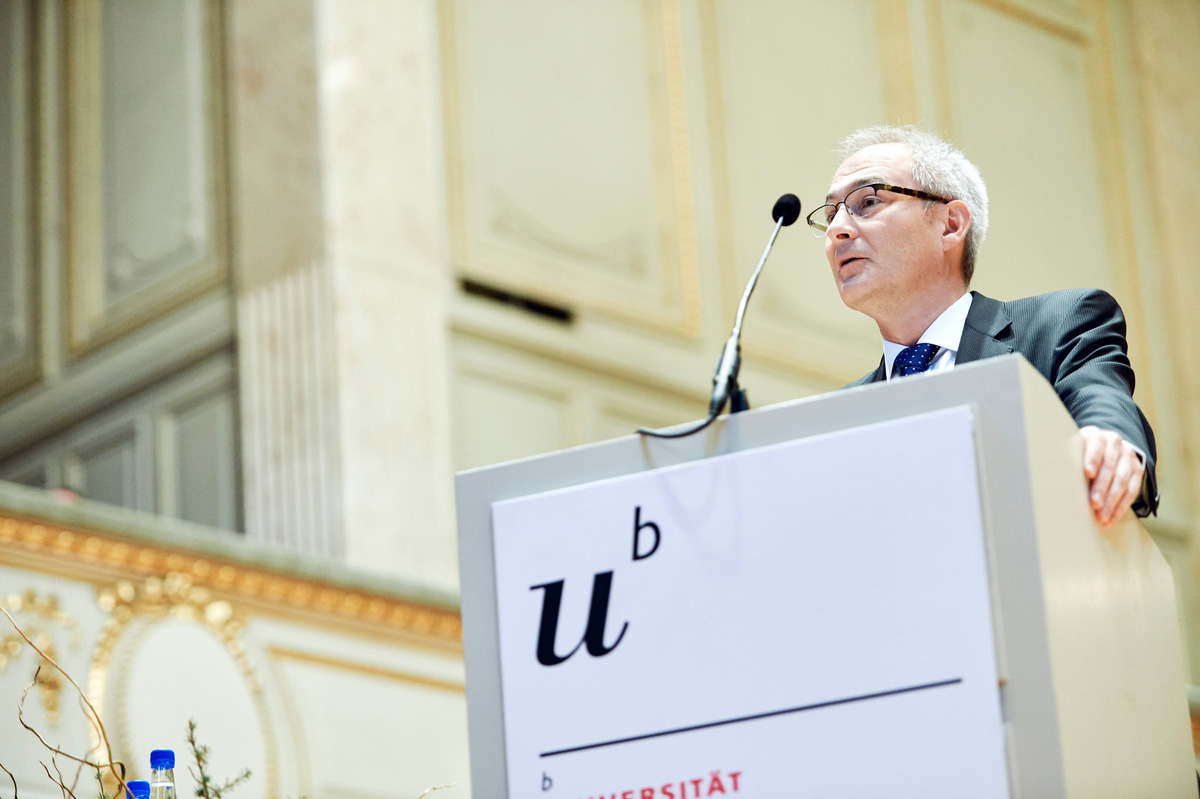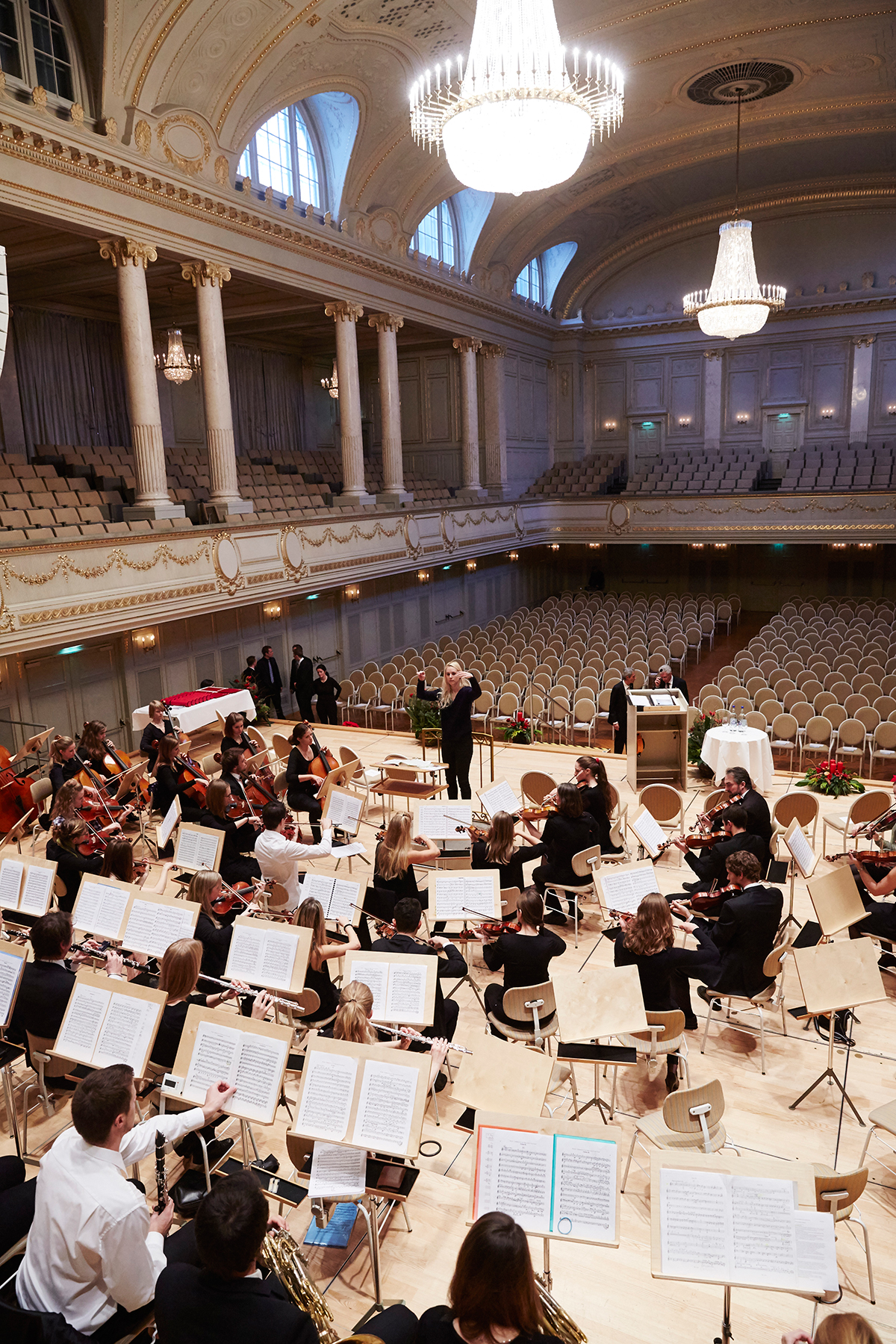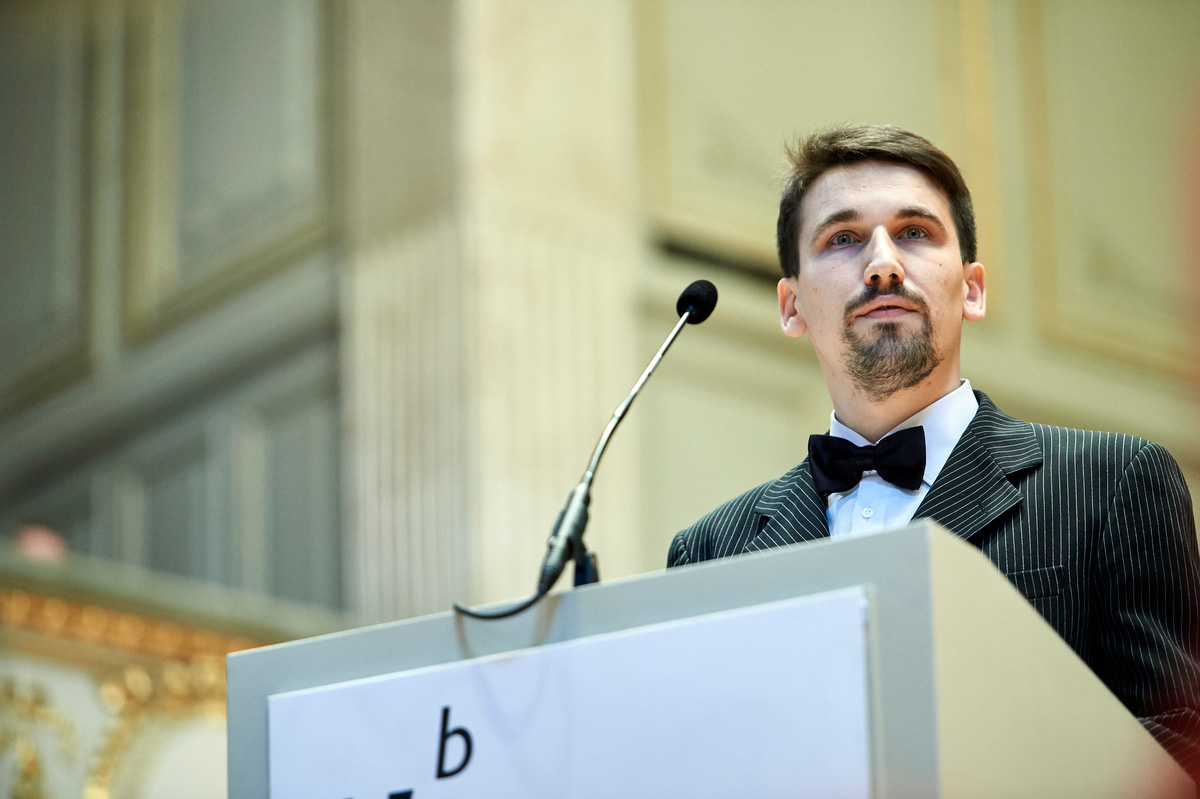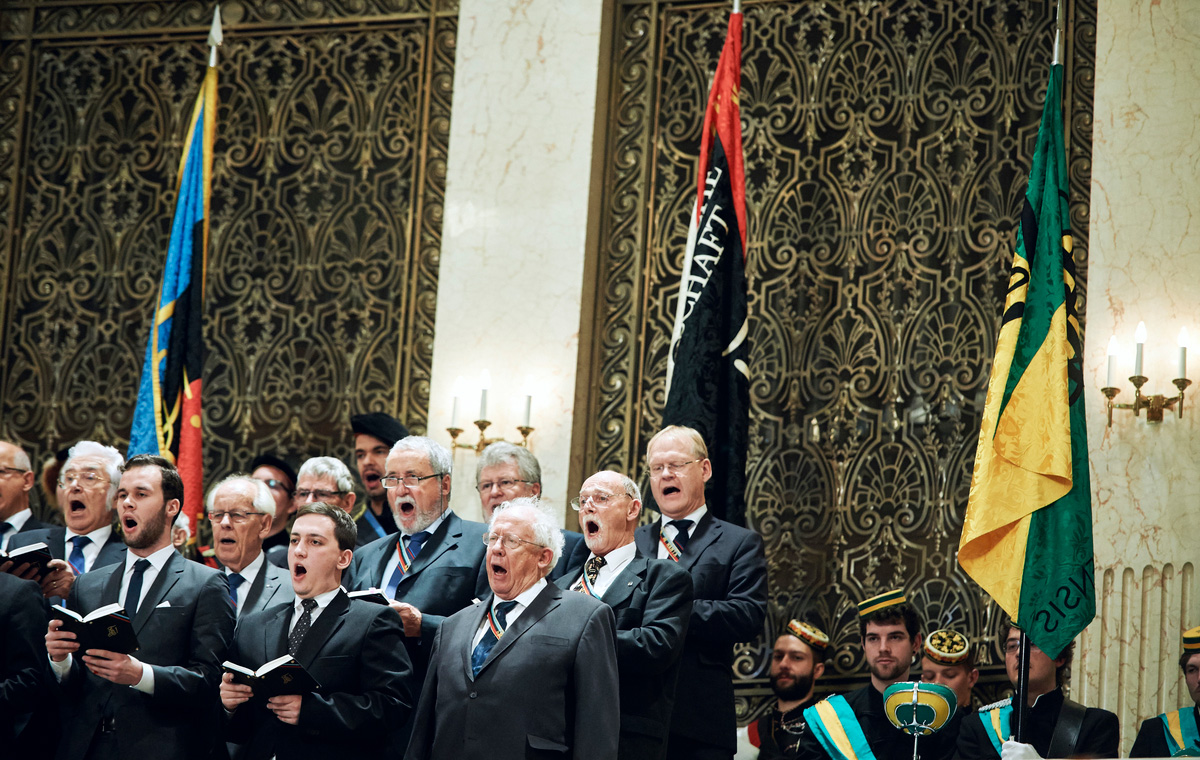«Freedom is essential for academic activity»
At the University of Bern’s 181st Dies academicus, Rector Martin Täuber emphasised the university’s autonomy as the basis for its success and stressed the importance of international networking. Executive Councillor Bernhard Pulver warned on his part against pitting vocational education and universities against each other. David Ginsbourger from the University of Bern’s Intermediate Staff Association (MVUB) ultimately called for more flexible «tenure-track» positions for aspiring researchers. Seven personalities were awarded an honorary doctorate and eleven researchers were honoured with academic prizes.
In his speech Rector Martin Täuber paid tribute to the work of his recently deceased predecessor Urs Würgler, who helped the University of Bern to gain more national and international appeal with the «Strategy 2012». The subsequently further developed «Strategy 2021» shows success, says Täuber: Bern is today the third largest university in Switzerland with a total of 24,000 students and employees. It is home to seven «National Centres of Competence in Research», and it has been able to double the amount of third-party funds raised in comparison to the year 2000.
The increased autonomy due to the revised University Law of 2010 has also contributed to stability and productivity at the University of Bern. This is essentially due to Director of Education Bernhard Pulver and the Grand Council, said Täuber: «For the university, the trust of the government signifies an important basis for its success. The freedom to try out new things, to suffer failures and to celebrate discoveries – this freedom is essential for academic activity.»
As an outlook Täuber formulated his concern about the relationship with Europe and emphasised that an exclusion of Switzerland from the European research landscape would severely disrupt the scientific productivity of our country. As another challenge Täuber mentioned that science itself is also constantly changing. Catchwords for this are, for example, «big data» or personalised medicine. «As a university we have the task and the privilege to contribute to these important topics. So we can help to shape the future in an ethical and intelligent manner, as we have already done in the past.»
Against restricting the choice of degree and research
Director of Education Bernhard Pulver was pugnacious in his speech. The Executive Councillor emphasised that he would find it regrettable if vocational education or a university of applied science would be pitted against the university, and the humanities and social sciences would be pitted against the natural sciences. He indicated that young people should opt for a secondary school education or a vocational education pursuant to their aptitudes and talents, and they must be shown adequate trust. Moreover, the educational system is certainly transparent.
The Director of Education resolutely espoused that the state may not interfere in the realm of personal responsibility with regard to the free choice of profession and career, and firmly protested against restricting the free choice of degree and the introduction of a Numerus clausus – he feels reminded of the German Democratic Republic (GDR), where – pursuant to planned target figures – young persons “were compelled to choose degree programmes for which they were neither talented nor motivated”. It is common knowledge that the history and economic development of the GDR would not have agreed with this «initiative for qualified personnel».
Pulver finally emphasised that the research assignments from universities of applied science and universities are different, but absolutely equivalent. However, he stated that «certain educational policy-makers would always only ask about the direct benefit of education, about the direct commercial applicability of research». The policy should not stipulate the university that research and teaching would always have to be practically relevant. For example, the findings of the ROSINA/Rosetta space mission – in which the University of Bern is involved – are not outright commercially applicable, but contributed towards clarification of fundamental questions with regard to the origin of the universe.
Pulver concluded his speech by noting that today it is possibly less pivotal what a person studies, since education and profession would have been long since decoupled. The ability to constantly develop and utilise one’s own knowledge is the most important thing that the university can give its graduates to take with them – regardless of the chosen field of study.
New strategies in dealing with antibiotics
In his academic speech Rector Martin Täuber addressed the medical challenges in dealing with infectious diseases and antibiotic resistance. While the search for new vaccinations against infections such as HIV or Ebola is being intensively pursued, researchers and the pharmaceutical industry have hardly endeavoured to find new antibiotics in recent decades. According to Täuber, there are also economic reasons for this: the development of a new antibiotic agent costs millions of Swiss francs. Moreover, an economic risk arises because the agent would be reluctantly utilised, since it would only be reserved for patients who could not be treated with a different antibiotic agent. At any rate, certain incentives could help to make this risk justifiable in this case.
An alternative strategy could be that instead of killing pathogenic bacteria, one could attempt to identify their toxins and neutralise them with suitable medications. For instance, a Bernese research group recently managed to neutralise the pathogenic substances during an infection with so-called «liposomes», and therefore to favourably influence the illness in an experiment. But Täuber emphasised that antibiotic-free treatments should not be anticipated in the short term – perhaps also not in the long term. Further challenges would also be added to antibiotic resistance, such as the occurrence of tropical fever in Europe due to increasing global warming. «Our researchers together with their global partners continue to focus on finding solutions for these problems», said Täuber.
More flexible career options for young researchers
In his speech, PD Dr. David Ginsbourger, representative of the University of Bern’s Intermediate Staff Association (MVUB), advocated creating special positions at Swiss universities which enable young researchers to plan their academic career on a more long-term basis: «As seen from the perspective of the MVUB, predictability during the postdoctoral phase is pivotal for a sustainable academic career», he said. In many places the old academic career structure from doctorate to lectureship and/or professorship has been broken in favour of the more flexible «tenure-track» system. This system offers young researchers the chance to obtain a regular, permanent professorship after a probation period.
But tenure-track positions still only constitute a small percentage of junior positions. Moreover, many tenured professorships are severely stretched with managerial and organisational duties. More positions on the level of Anglo-Saxon associate professors could help to relieve the burden on tenured professorships, says Ginsbourger. The University of Bern is already showing initiative here, but the attractiveness of an academic career can only be sustainably enhanced with the non-professorial teaching staff. So, concluded Ginsbourger, the University of Bern can even take on a «pioneering role» in this field.
Honours and prizes
Following the speeches, seven personalities were awarded with an honorary doctorate in a solemn ceremony:
- The Faculty of Law confers the title of Doctor iuris honoris causa upon attorney
Hanspeter Uster, Baar
- The Faculty of Business, Economics and Social Sciences confers the title of Doctor rerum oeconomicarum honoris causa upon
Ms Eva Jaisli, Burgdorf
- The Faculty of Medicine confers the title of Doctor medicinae honoris causa upon
Mr Denis de Limoges, Gümligen
- The Faculty of Humanities confers the title of Doctor philosophiae honoris causa upon
Dr. Marco Jorio, Rüfenacht ...
... as well as
Prof. Dr. Christian Meier, Hohenschäftlarn, Germany.
- The Faculty of Human Sciences confers the title of Doctor philosophiae honoris causa upon
Prof. David F. Bjorklund, PhD, Boca Raton, Florida, USA
- The Faculty of Science confers the title of Doctor philosophiae honoris causa upon
Ms Dava Sobel, East Hampton, NY, USA
Eleven researchers were also honoured with academic prizes:
- The 2015 Hans Sigrist Prize goes to
Prof. Luciano Marraffini, PhD
- The Theodor Kocher Prize goes to
Prof. Dr. med. Moritz Tannast
- The Bernese Prize for Environmental Research goes to
Dr. Pierrick Buri
and the recognition award goes to
Ms Bettina Scharrer
- The Dr. Lutz Zwillenberg Prize goes ex aequo to
Ms Jennifer Gebetsberger, PhD, Ms Maria Luisa Martinez Merino, PhD and Ms Gina Retschnig, PhD
- The Senior Citizens’ University Prize for Research on Ageing: The following prizes are awarded for the academic year 2014/2015: the prize for an outstanding dissertation goes ex aequo to
Dr. phil. Stefanie Spahni and Dr. rer. oec. Jonas Zeller
and the prize for an outstanding master’s thesis goes to
Mr Florian Müller, Master of Arts in History
- The Credit Suisse Award for Best Teaching goes to
Prof. Dr. Wolfgang Nentwig
Please gather the detailed laudatory speeches and curricula vitae of those honoured as well as photos of the occasion from the Dies academicus website.
2015/12/05

